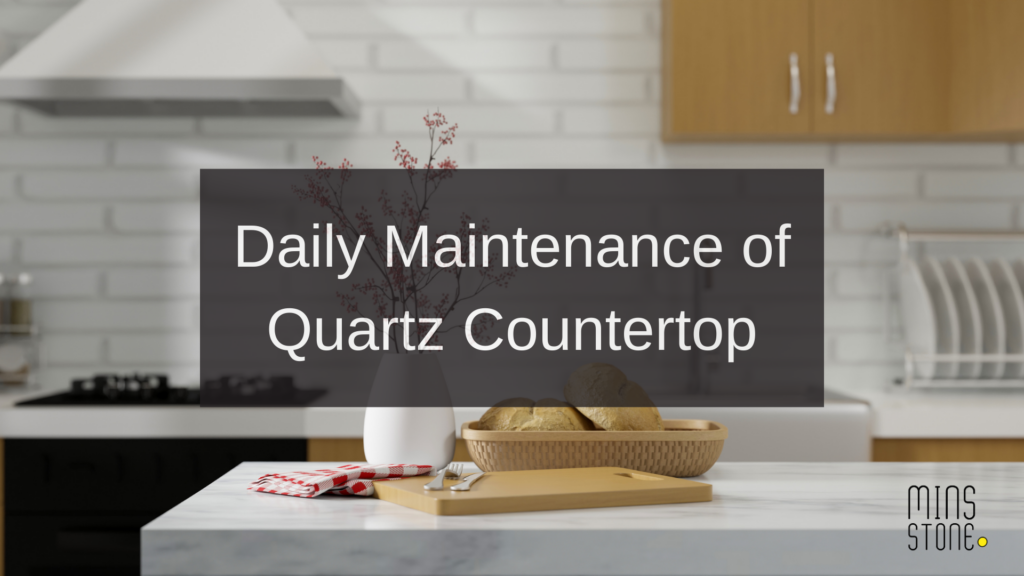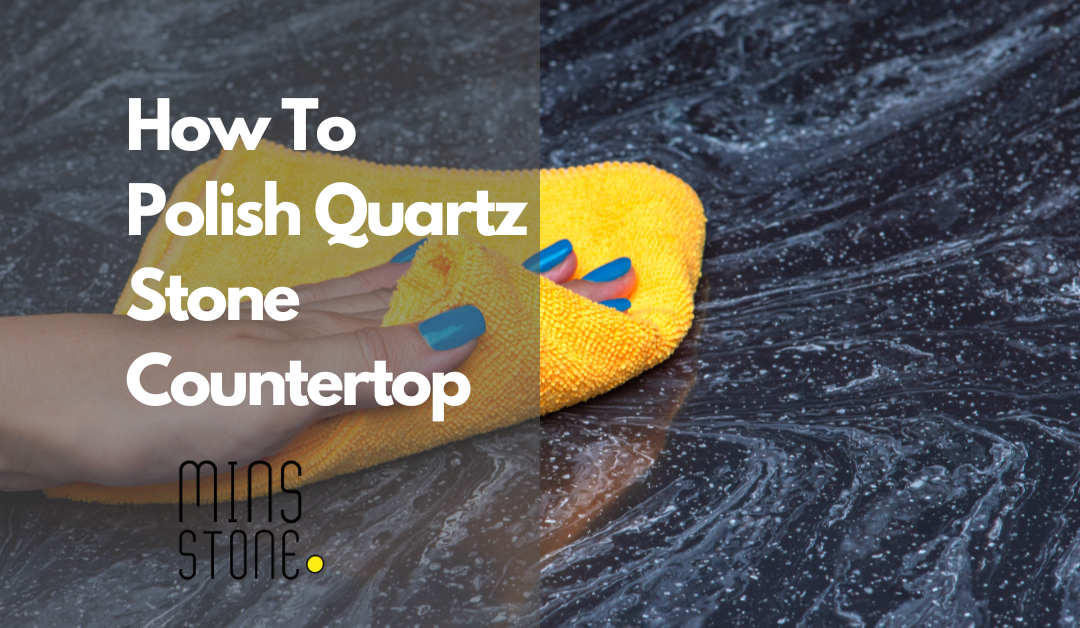Quartz stone countertops have become a popular choice for homeowners due to their durability, aesthetic appeal, and low maintenance requirements. However, over time, these countertops may lose their shine and develop dull spots. This is where the process of polishing comes into play. Polishing quartz countertops not only restores their original luster but also helps protect them from stains and scratches.
This is a proven guide by our experts, we will walk you through the steps required on how to polish quartz stone countertops effectively.
A quick overview of what we recommend you do before polishing quartz:
- Do not use abrasives or strong products to clean.
- Try using clean water and detergent first, before trying stronger cleaning products (Note: Must be quartz stone friendly).
- Lastly, try doing a forceful cleaning with water and neutral detergent before going for a polish.
Why Polishing is Important For Your Quartz
Even though quartz countertops are highly durable, they can still develop scratches, dull spots, and loss of shine over time. This can be caused by various factors, including daily use, exposure to abrasive materials, and cleaning with harsh chemicals. Polishing is essential to restore the original luster and shine of your quartz countertops. It helps remove surface imperfections, fills in minor scratches, and enhances the overall appearance of your countertops.
Preparing for the Polishing Process:
Before you begin polishing your quartz countertops, gathering all the necessary tools and materials is essential. This includes:
- Polishing compound: Choose a high-quality polishing compound specifically designed for quartz surfaces.
- Polishing pads or wheels: Select polishing pads or wheels suitable for quartz countertops. These can be found in various grits, ranging from coarse to fine.
- Masking tape: Masking tape protects surrounding areas, such as cabinets or walls, from accidental damage.
- Soft cloth or microfiber towel: These will be used for cleaning and applying the polishing compound.
- Water spray bottle: Fill a water spray bottle with clean water to keep the countertop surface moist during the polishing process.
Before polishing your quartz countertops, it is crucial to clean the surface thoroughly. Use a mild, non-abrasive cleaner and a soft cloth or sponge to remove any dirt, grime, or stains. Rinse the countertop with water and dry it completely using a clean, lint-free cloth. Ensure that there are no leftover cleaning residues, as these can interfere with the polishing process.
Step-by-Step Guide to Polishing Quartz Countertops:
Step 1: Inspect and Repair any Damage:
Start by inspecting the entire countertop surface for any visible damage, such as deep scratches or chips. If you notice any significant damage, it is recommended to contact a professional for repairs before proceeding with the polishing process. Minor scratches and imperfections can often be addressed during the polishing process itself.
Step 2: Masking and Protecting Surrounding Areas:
To prevent accidental damage to surrounding areas, use masking tape to cover any cabinets, appliances, or walls adjacent to the countertop. This will create a protective barrier and ensure that only the countertop surface is worked on during the polishing process.
Step 3: Applying the Polishing Compound:
Apply a small amount of the polishing compound to the countertop surface. Using a soft cloth or microfiber towel, spread the compound evenly over the entire surface in circular motions. Make sure to cover all the dull spots and scratches.
Step 4: Using a Polishing Pad or Wheel:
Attach the appropriate polishing pad or wheel to a handheld polisher or a variable speed grinder. Begin polishing the countertop surface using gentle, overlapping passes. Keep the polishing pad or wheel flat against the surface and maintain a consistent speed and pressure. Gradually move from one section of the countertop to another until the entire surface has been polished.
Step 5: Polishing the Edges:
To polish the edges of the countertop, switch to a smaller polishing pad or wheel that can reach the tight corners and edges. Use the same technique as before, applying the polishing compound and making overlapping passes until the edges are polished to match the rest of the countertop surface.
Step 6: Cleaning and Finishing Touches:
Once the polishing process is complete, clean the countertop surface with a damp cloth to remove any residue from the polishing compound. Inspect the countertop for any missed spots or imperfections and repeat the polishing process if necessary. Finally, dry the countertop surface thoroughly to reveal its renewed shine.

Maintaining and Caring for Polished Quartz Countertops
Here are some daily cleaning and maintenance guides for all new quartz stone tabletop owners out there,
To keep your polished quartz countertops looking their best, follow these daily cleaning and maintenance tips:
- Wipe up spills immediately: Clean up any spills or stains promptly to prevent them from seeping into the countertop surface.
- Use mild cleaners: Opt for mild, non-abrasive cleaners specifically designed for quartz surfaces. Avoid using harsh chemicals or abrasive scrubbers that can dull the shine.
- Avoid cutting directly on the countertop: Always use a cutting board to prevent scratches and damage to the polished surface.
- Use trivets or hot pads: Place trivets or hot pads under hot pans or pots to protect the countertop from heat damage.
- Avoid abrasive materials: Do not use abrasive sponges or scrubbers that can scratch the surface of the countertop.
- Regularly clean with water and a soft cloth: Wipe down your quartz countertops daily with a damp cloth to remove any dust or debris.
In addition to daily cleaning, there are several preventive measures you can take to maintain the shine and longevity of your polished quartz countertops:
- Use cutting boards and trivets: Always use cutting boards when preparing food and place trivets or hot pads under hot pans or pots to avoid direct contact with the countertop surface.
- Avoid using sharp objects directly on the countertop: Sharp objects like knives or scissors can cause scratches on the polished surface. Use caution when handling such objects.
- Don’t place heavy objects on unsupported areas: Avoid placing heavy objects on unsupported areas of the countertop, as this can cause cracks or damage.
- Use coasters and placemats: Place coasters under glasses and use placemats or table runners to protect the countertop from scratches caused by dishes or silverware.
Final Verdict: The Art of Polishing Quartz Countertops
In conclusion, polishing quartz countertops is a vital step to maintaining their beauty and extending their lifespan. By following the step-by-step guide on how to polish quartz stone countertops and implementing proper cleaning and maintenance practices, you can keep your quartz countertops looking pristine for years to come.
Remember to gather the necessary tools and materials, inspect and repair any damage, protect surrounding areas, apply the polishing compound, and use a polishing pad or wheel to achieve a polished finish. With regular care and preventive measures, your polished quartz countertops will continue to shine and enhance the overall aesthetics of your home.
If you’re having trouble with your quartz or natural stone surfaces and you live around KL, Selangor, and the states of West Malaysia, you can count on us to help you. Even if you are looking to purchase new quartz stone Malaysia tabletop,
Just reach out to us and our stone and quartz experts will be happy to help you.
Frequently Asked Question For Polishing Quartz Stone Countertops
How often should I polish my quartz countertops?
The frequency of polishing depends on the level of use and wear. As a general guideline, it is recommended to polish quartz countertops every 1-2 years to maintain their shine and luster. However, if you notice significant dullness or scratches, you may need to polish them more frequently.
Can I use vinegar or lemon juice for cleaning my polished quartz countertops?
It is best to avoid using acidic cleaners such as vinegar or lemon juice on polished quartz countertops. These acidic substances can dull the surface and cause etching over time. Stick to mild, non-abrasive cleaners specifically formulated for quartz surfaces.
Can I use a regular buffer or polisher for polishing quartz countertops?
It is recommended to use a handheld polisher or a variable speed grinder with appropriate polishing pads or wheels for polishing quartz countertops. These tools provide better control and allow you to achieve the desired results effectively.
Can I remove deep scratches on my quartz countertops through polishing?
While polishing can help minimize the appearance of minor scratches, deep scratches may require professional repair. Contact a quartz countertop specialist to assess the damage and determine the best course of action.




